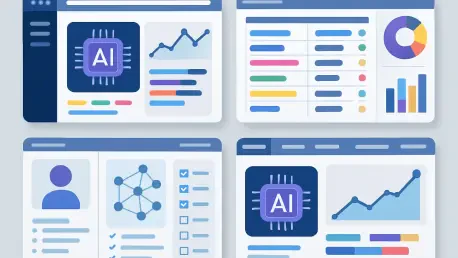Imagine a software development landscape where artificial intelligence (AI) tools promise to turbocharge productivity, yet the reality reveals a stark contrast in outcomes across different teams, highlighting a complex integration process. In this evolving ecosystem, engineering, product, and design teams experience the impact of AI in dramatically different ways. While the allure of faster code generation captivates developers, the hidden costs of debugging often negate those gains. Meanwhile, product managers (PMs) and designers find themselves wielding newfound capabilities to prototype and innovate at unprecedented speeds. This disparity raises critical questions about how AI is reshaping traditional roles in software development, particularly elevating the strategic importance of product management. As the industry grapples with these changes, it becomes clear that AI is not merely a tool for efficiency but a transformative force redefining how tech products come to life.
AI’s Impact on Development Teams
Challenges in Engineering Efficiency
The integration of AI into engineering workflows has been heralded as a game-changer, particularly with tools that accelerate code generation at a remarkable pace. However, beneath the surface of this apparent progress lies a significant challenge: the time saved in writing code is frequently offset by the extensive effort required to debug and refine AI-generated outputs. Reports from industry analyses indicate that developers who believed they gained a 20% speed increase actually spent 19% more time overall due to the need for corrections and security audits. This unexpected trade-off highlights a critical gap between perception and reality in AI’s application to coding tasks. As developers navigate this landscape, the focus shifts from sheer speed to ensuring quality and reliability, underscoring that AI’s benefits in engineering are not as straightforward as they might seem. The complexity of these tools demands a deeper understanding of their limitations, pushing teams to adapt their processes to balance innovation with meticulous oversight.
Hidden Costs of Rapid Coding
Beyond the initial excitement of AI-driven coding, the hidden costs become increasingly apparent as teams delve into the intricacies of implementation. The additional time spent on fixing bugs and conducting thorough security checks often erases the anticipated productivity gains, creating a frustrating cycle for engineering teams. Industry leaders have noted that while AI can churn out lines of code rapidly, the resulting errors or vulnerabilities require significant human intervention to resolve. This dynamic not only slows down project timelines but also places added pressure on developers to maintain high standards under tighter constraints. Moreover, the reliance on AI-generated code can sometimes lead to a false sense of security, where potential risks are overlooked until they manifest as critical issues. As a result, engineering teams must recalibrate their expectations, focusing on integrating AI as a supportive tool rather than a complete solution, ensuring that human expertise remains at the core of the development process.
Transforming Product Management and Design
Empowering Non-Technical Innovation
In stark contrast to the challenges faced by engineering teams, AI is proving to be a revolutionary asset for product and design professionals, empowering them to bring ideas to life with remarkable ease. Tools designed for rapid prototyping enable non-technical staff to translate their vision into tangible concepts without deep coding expertise, a capability described by industry experts as a transformative advantage. Venture capitalists and tech innovators alike have emphasized how this newfound ability allows PMs to communicate product intuition more effectively, bridging the gap between concept and execution. By leveraging AI, product teams can iterate quickly, testing multiple ideas in the time it once took to build a single prototype. This shift not only accelerates the development cycle but also frees up engineering resources from early-stage builds, allowing for a more efficient allocation of technical talent. The democratization of innovation through AI tools marks a significant turning point, positioning product managers as key drivers of creativity in tech projects.
Redefining Strategic Roles
The rise of AI in product management extends far beyond prototyping, fundamentally altering the strategic responsibilities of PMs in the software development landscape. As AI tools become integral to bridging business needs with technological capabilities, the role of product managers evolves into that of a vital connector between design, engineering, and market demands. Leading tech companies are actively seeking AI-savvy PMs to navigate this complex intersection, recognizing their importance in anticipating the specific contexts where AI agents can deliver maximum value. Industry voices describe this as an unprecedented form of product management, where the ability to foresee and adapt to AI-driven possibilities becomes a critical skill. This transformation elevates PMs from mere coordinators to strategic visionaries, tasked with harnessing AI to align product goals with broader business objectives. As a result, the emphasis shifts from technical output to cultivating a deep understanding of product vision, ensuring that AI serves as a catalyst for meaningful innovation rather than a standalone solution.
Future Horizons for Product Teams
Looking ahead, the influence of AI on product teams promises to deepen, setting the stage for even greater advancements in how software is conceptualized and delivered. The ability of AI to streamline workflows and enhance collaboration between technical and non-technical stakeholders suggests a future where product management becomes increasingly central to organizational success. Industry trends indicate that the demand for PMs with expertise in AI contexts will continue to grow, as businesses recognize the value of strategic oversight in leveraging these technologies. This evolution also points to a broader cultural shift within tech companies, where product intuition and contextual understanding are prioritized over raw coding efficiency. As AI continues to redefine traditional boundaries, product teams must adapt by honing skills that complement these tools, ensuring they remain agile in a rapidly changing environment. The journey forward will likely see PMs not just adapting to AI, but actively shaping its role in crafting products that resonate with both users and business goals.









